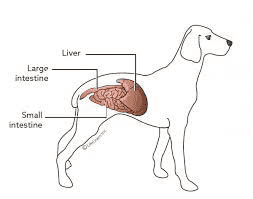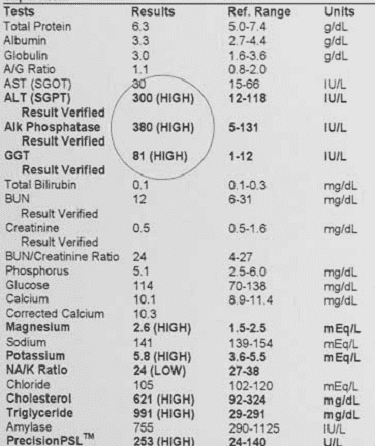If your veterinarian has ever told you that your dog’s liver enzymes are elevated, this should help you understand what this means?
Animal blood tests are an important part of monitoring your dog’s internal organs as well as his/her immune system, so your veterinarian may routinely recommend checking them. In addition, prior to any anesthesia and surgical procedure blood tests are usually performed to ensure patient safety.

Liver values (enzymes) are measured on most blood panels. How the liver enzymes are interpreted depends upon the age and breed of your dog, history of certain medications, what (if any) clinical signs your dog has, as well as the specific lab results.
A lot of times the increase in liver enzymes is mild and self-limiting; but in some instances, it can indicate an underlying liver disease.
Which of the lab values are the liver enzymes?
The main liver enzymes that your veterinarian may look at include the ALT (alanine aminotransferase) and ALP (alkaline phosphatase).
Liver enzymes can be elevated from liver disease or can be secondarily affected by other diseases or processes outside the liver, e.g. pancreatitis (inflammation of the pancreas), intestinal disease, or certain hormonal diseases such as diabetes or Cushing’s disease ( overactive adrenal gland(s) producing too much cortisol).
Certain medications, such as steroids or phenobarbital (antiseizure drug), can also cause elevations in liver enzymes. Additionally, certain illnesses such as heart conditions can lead to enzyme changes as well.

Why is age and breed important?
Puppies will normally have an elevated ALP because ALP is also produced from growing bones, not just liver cells. Some older dogs will have a benign accumulation of water, carbohydrates, or fat in the liver cells (so called vacuolar hepatopathy)… Others can develop nodules as an aging change. These diseases typically causes primarily an elevated ALP and do not really affect liver function or require treatment.
Elevations in ALT and ALP do not necessarily mean the liver is in failure, or not working properly. However, your veterinarian may recommend another blood test, called bile acids (before feeding and after feeding), to assess liver function. Another test that can be used to assess how the liver is working is bilirubin.
This is the yellow pigment that builds up in the body when an animal is jaundiced. If the bilirubin is increased, this already indicates decreased liver function (unless the patient is also severely anemic) – so bile acids testing in this situation is not indicated as it will not provide additional information.
Certain breeds are prone to particular diseases. For instance, an older Dachshund with elevated liver enzymes may have Cushing’s syndrome Labradors, Bedlington terriers, Westies, and Dobermans are predisposed to chronic hepatitis (inflammation of the liver). Shelties and Cocker Spaniels are prone to gallbladder problems.
The fact that we see certain diseases in specific breeds suggests that there is a genetic component to some of these processes.
My dog isn’t having any symptoms. Should I be worried about the elevated liver enzymes?

copper storage disease
Dogs with severe liver disease can have a variety of clinical signs – decreased appetite, vomiting, diarrhea, abdominal distention from fluid, and once very severe issues occur, jaundice (yellow discoloration of gums, eyes, skin, etc). However, some dogs with significant liver disease may not show any clinical signs in the early stages.
It is preferable to diagnose and treat patients before they get sick. As a result, further workup may still be recommended, even if the dog is not having any clinical signs. An example of this is if your dog has a persistently increased ALT – this can be the first sign of chronic hepatitis which can progress to liver failure.
Some cases of chronic hepatitis are due to abnormal storage of copper in the liver that will continue unless you intervene medically, this can only be diagnosed through biopsies and special staining.
If your dog isn’t acting sick and the values aren’t too high, your veterinarian may recommend a therapeutic trial of antibiotics (to rule out a possible bacterial hepatitis), antioxidants (such as vitamin E, Denamarin), or ursodiol (a drug that increases bile flow and decreases inflammation).
After a few weeks of therapy, the liver values would be rechecked . If the liver enzymes did not improve significantly, then further diagnostics are needed.
Besides blood tests, what else can be done to diagnose liver problems?
Your veterinarian may recommend further tests such as an abdominal ultrasound and based on what is found, a liver biopsy may be needed. Liver biopsies can be obtained with a needle biopsy instrument using ultrasound guidance, via a scope (laparoscope) or surgery.
While the biopsy during ultrasound is the least invasive and the most cost efficient, there is concern that these samples are not large enough for a good evaluation. However the biopsies are collected, samples are taken for histopathology, culture (to rule out infections) and often for measuring copper levels. Your veterinarian may refer you to a specialist for further workup.
The treatment and prognosis depend on what is causing the elevated liver enzymes. By partnering with your veterinarian, an optimal treatment plan can be made once the diagnosis is known.


